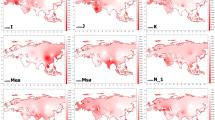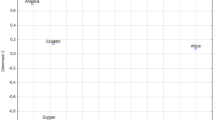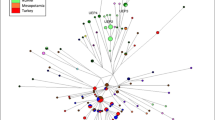Abstract
Genetic differences among human populations are usually larger for the Y chromosome than for mtDNA1,2,3. One possible explanation is the higher rate of female versus male migration due to the widespread phenomenon of patrilocality, in which the woman moves to her mate's residence after marriage. To test this hypothesis, we compare mtDNA and Y-chromosome variation in three matrilocal (in which the man moves to his mate's residence after marriage) and three patrilocal groups among the hill tribes of northern Thailand. Genetic diversity in these groups shows a striking correlation with residence pattern, supporting the role of sex-specific migration in influencing human genetic variation.
This is a preview of subscription content, access via your institution
Access options
Subscribe to this journal
Receive 12 print issues and online access
$209.00 per year
only $17.42 per issue
Buy this article
- Purchase on Springer Link
- Instant access to full article PDF
Prices may be subject to local taxes which are calculated during checkout

Similar content being viewed by others
References
Seielstad, M.T., Minch, E. & Cavalli-Sfroza, L.L. Nature Genet. 20, 278–280 (1998).
Perez-Lezaun, A. et al. Am. J. Hum. Genet. 65, 208–219 (1999).
Jorde, L.B. et al. Am. J. Hum. Genet. 66, 979–988 (2000).
Burton, M.L., Moore, C.C., Whiting, J.W.M. & Romney, A.K. Curr. Anthropol. 37, 87–123 (1996).
Kimura, M. et al. Hum. Biol. 70, 993–1000 (1998).
Anderson, S. et al. Nature 290, 457–465 (1981).
Burckhardt, F., von Haeseler, A. & Meyer, S. Nucleic Acids Res. 27, 138–142 (1999).
Nei, M. Molecular Evolutionary Genetics (Columbia Univ. Press, New York, 1987).
Slatkin, M. Genetics 139, 457–462 (1995).
Salem, A.H., Badr, F.M., Gaballah, M.F. & Pääbo, S. Am. J. Hum. Genet. 59, 741–743 (1996).
Bamshad, M.J. et al. Nature 395, 651–652 (1998).
Bamshad, M. et al. Genome Res. 11, 994–1004 (2001).
Acknowledgements
We thank S. Brauer and H. Schädlich for technical assistance, and B. Pakendorf, R. Cordaux, M. Kayser, I. Nasidze, S. Pääbo and A. Ryan for helpful discussion. H.O. was supported by a fellowship from the Japanese Society for the Promotion of Science (JSPS). Sample collection was supported by funds from the JSPS and the Ministry of Education, Science, and Culture, Japan; research was supported by funds from the Max Planck Society, Germany.
Author information
Authors and Affiliations
Corresponding author
Rights and permissions
About this article
Cite this article
Oota, H., Settheetham-Ishida, W., Tiwawech, D. et al. Human mtDNA and Y-chromosome variation is correlated with matrilocal versus patrilocal residence. Nat Genet 29, 20–21 (2001). https://doi.org/10.1038/ng711
Received:
Accepted:
Published:
Issue Date:
DOI: https://doi.org/10.1038/ng711
This article is cited by
-
Genetic evidence suggests a sense of family, parity and conquest in the Xiongnu Iron Age nomads of Mongolia
Human Genetics (2021)
-
New insights on intercontinental origins of paternal lineages in Northeast Brazil
BMC Evolutionary Biology (2020)
-
The Early Peopling of the Philippines based on mtDNA
Scientific Reports (2020)
-
Cultural variation impacts paternal and maternal genetic lineages of the Hmong-Mien and Sino-Tibetan groups from Thailand
European Journal of Human Genetics (2020)
-
In Memoriam
Human Nature (2020)



